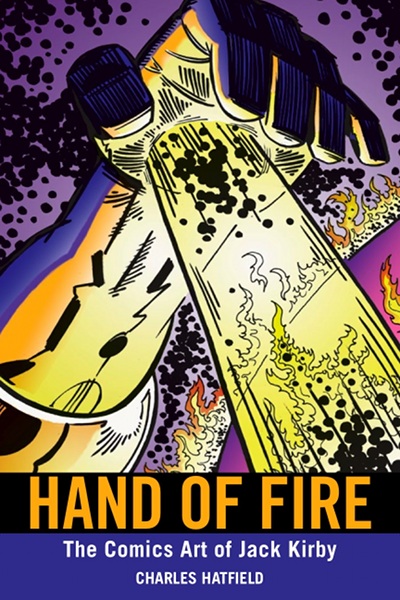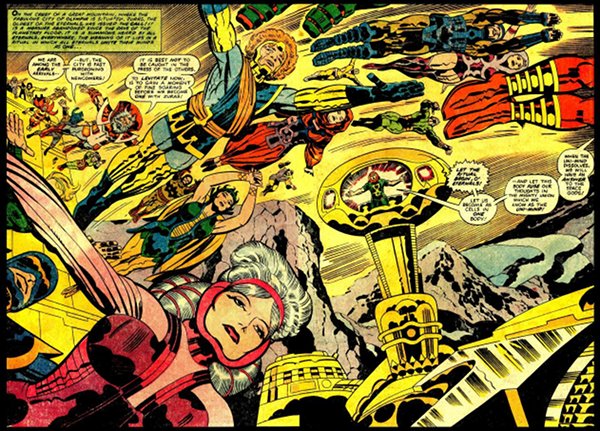
March 4, 2012
 CR Sunday Interview: Charles Hatfield
CR Sunday Interview: Charles Hatfield


*****

I've known
Charles Hatfield since he was one of the go-to writers at
The Comics Journal in the mid- to late-1990s. He has since become one of my windows into the world of academic writing about comics, although I'll take his views any place and in any context I can access them. Hatfield's second major book-length work on the medium -- after 2005's
Alternative Comics: An Emerging Literature -- has just dropped.
Hand Of Fire: The Comics Art Of Jack Kirby presents the
California State University (Northridge) professor's body of thinking on the seminal comics figure. I had a blast reading it, and it's hard for me to comprehend how much fun it would be to take a course with this work as the core of its required reading. As has always been the case with my enjoyment of Hatfield's writing, it's the side arguments and component theories that are for me as much fun as any overarching conclusion. I believe that particular focus for my enthusiasm is reflected in the following interview, which at times becomes a series of "And what about this? And what about that?" questions. I am grateful Hatfield took the time to indulge me, and I'm pleased this work is out there. -- Tom Spurgeon
*****
TOM SPURGEON: You mentioned in your introduction some of your history with reading Jack Kirby comics, and that this stretches back to childhood. How much of your childhood perspective on Kirby do you maintain in your current way of looking at the artist, do you think? Do you think it helps or hurts to have read Kirby then in terms of the kind of analysis you want to bring to him now?
CHARLES HATFIELD: I like to describe
Hand of Fire as a tug o'war between the ten-year-old me and the older, professorial me. But I don't suppose it's a tug o'war so much as an overlaying of one on top of the other. The ten-year-old me is still at work in there somewhere, whispering or nudging or just making trouble. Or perhaps just supplying the initial oomph, the enthusiasm that gets me going and propels the whole thing.
I had worried that working on
Hand of Fire for so long -- six years, at least -- would suck the air, the joy, out of reading Kirby for me, but thankfully that hasn't happened. My guess is that a childhood perspective is part of, though not necessarily the biggest part of, what motivates my work on Kirby and keeps me going. There's also the buzz of new discovery, or rediscovery, to fuel the work.
As I say at the front of the book, I couldn't have done what I do in
Hand of Fire as a child, or even half a lifetime ago as a young adult. I don't think I could have done it as well even as recently as, say, 2000 to 2005, the period when I finished my PhD thesis and turned it, very gradually, into what became my first book,
Alternative Comics. I couldn't have pulled off
Hand of Fire then. The childhood perspective needed to steep a while, and various adult perspectives I had learned in the meantime had to be adjusted, challenged, or unlearned in order for me to move forward.
Until I started writing for
The Jack Kirby Collector back in the '90s, I had put a lot of time and distance between me and my ten-year-old, Kirby-mad self. I got trained as a traditional sort of literature scholar. Pretty well trained, I'd say. In fact the path I took to studying comics academically was roundabout, and crazy: I didn't do any dedicated coursework on comics anywhere, nor in cultural studies per se, and the comics were something apart from my schoolwork: my escape valve, I guess.
When I did my MA and PhD, my coursework and official interests were mostly in traditional literature, that and composition studies, the latter because I was learning to teach writing. Of course I got some literary, rhetorical, and cultural theory in the process. But the courses I was taking were solidly in fields that were already known to be important, in the English department sense of things. Already consecrated. So my way into comics studies at the PhD stage was about belatedly taking my extracurricular, unofficial passion and insisting that I get official credit for it.
Some of what I learned during all those years may have gotten in the way of Kirby, but some of it helped me see Kirby in new ways (ahem, cue the long excursus on
semiotics in Chapter One!). As I said, learning and unlearning. The main thing was to unlearn some of the suspicion of childhood pleasure I had learned in the meantime.
Thierry Groensteen, in one of his essays, says we comics scholars might as well admit that many of us are just reaching out to our childhood selves. I see that: I'm reaching back across that gulf, though now equipped with a different sort of knowledge. As someone who teaches and takes an interest in children's reading and culture, I don't feel any hesitation about claiming that!
 SPURGEON: We're approximately the same age. Something I always find interesting about those that came to Kirby in the '70s is the strange reputation he enjoyed at the time. All the kids I knew that read comics -- not that there were a lot, mind you -- loved the Kirby reprints and maybe enjoyed some of the New Gods stuff when we were younger. Yet as we became little 10-14 year old sophisticates, we really didn't like Kir
SPURGEON: We're approximately the same age. Something I always find interesting about those that came to Kirby in the '70s is the strange reputation he enjoyed at the time. All the kids I knew that read comics -- not that there were a lot, mind you -- loved the Kirby reprints and maybe enjoyed some of the New Gods stuff when we were younger. Yet as we became little 10-14 year old sophisticates, we really didn't like Kir
posted 5:00 am PST | Permalink
Daily Blog Archives
November 2019
October 2019
September 2019
August 2019
July 2019
Full Archives


